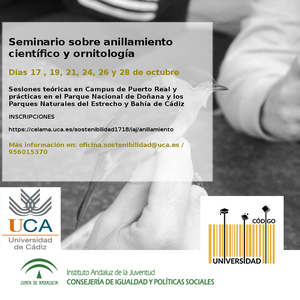El conocimiento de los distintos hábitats que nos rodean y las especies de flora y fauna integradas en éstos, motivan su conservación. La protección mediante la Red
de Espacios Naturales de Andalucía es una de las claves para su preservación, al igual que acercar a la población a estos entornos y ampliar sus conocimientos sobre
ellos, incrementa las posibilidades de éxito en su continuidad.
La Ornitología como ciencia incluida en la Zoología, es una de las más atractivas para el ser humano, por su visibilidad y el atractivo estético de las aves. El anillamiento científico de aves sirve como herramienta para acercar a las personas interesadas al mundo de la Ornitología, así como al método científico y sus aplicaciones reales posteriores.
OBJETIVOS DEL SEMINARIO “ORNITOLOGÍA Y ANILLAMIENTO CIENTÍFICO”
– Acercar a la comunidad universitaria un grupo de especies atractivo con el que ahondar en la sensibilización y la participación en la gestión, protección y
mantenimiento de los espacios naturales protegidos y la biodiversidad.
– Ampliar los conocimientos sobre las aves como especies emblema para la preservación de los hábitats que nos rodean.
– Mostrar un grupo tan interesante y diverso como las aves. Enseñando sus características y peculiaridades, pudiendo reconocerlas a través de sus caracteres externos.
– Demostrar las aplicaciones prácticas de esta actividad, relacionadas con la educación ambiental y el turismo ornitológico.
-Formar sobre los métodos de estudio de este grupo faunístico, destacando el anillamiento por su interés educativo y potencia en la información obtenida.
Información e inscripción: https://celama.uca.es/sostenibilidad1718/iaj/anillamiento


